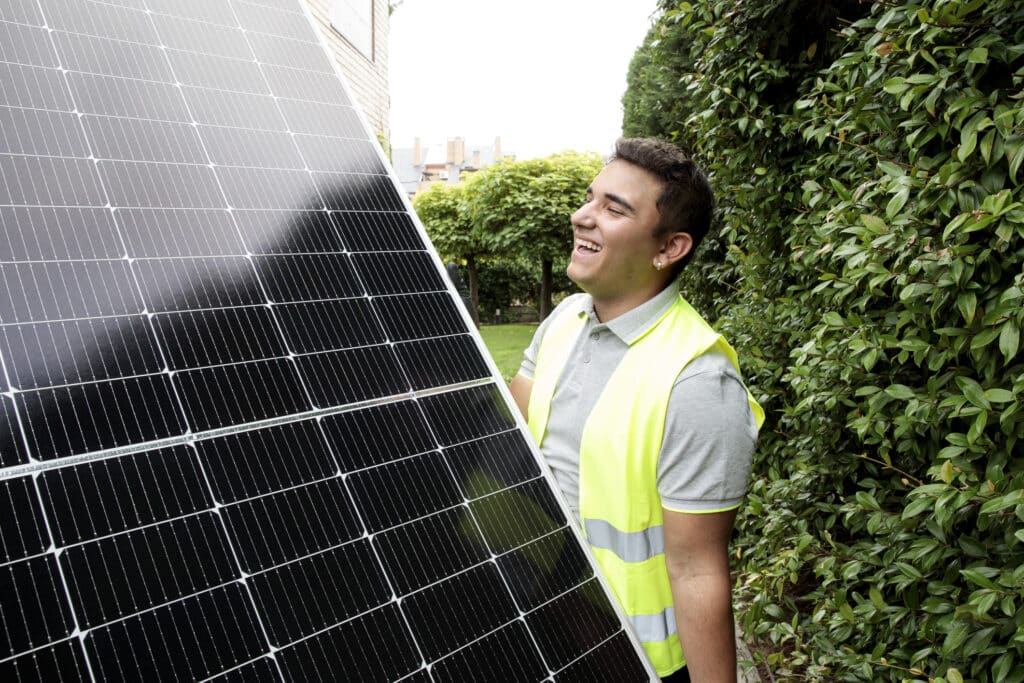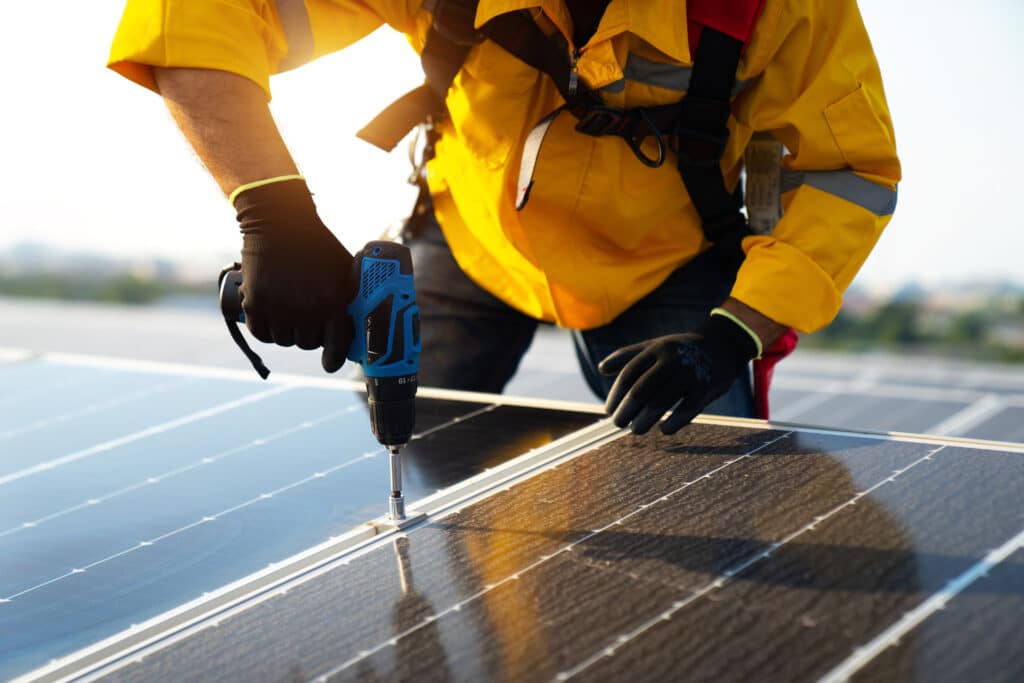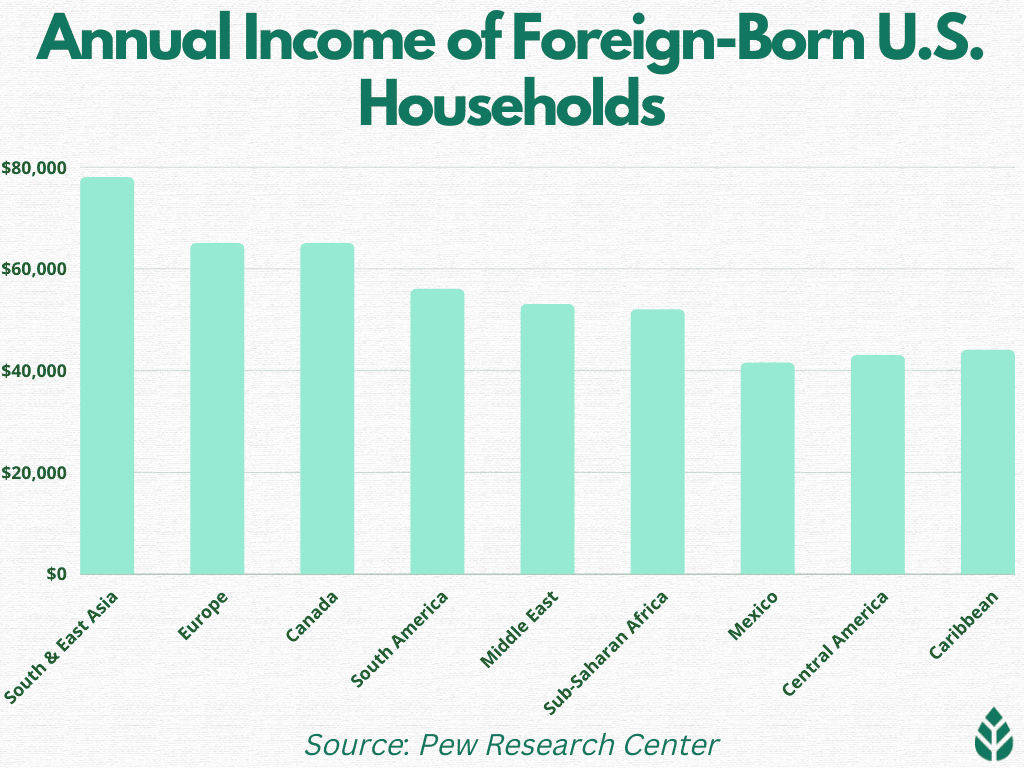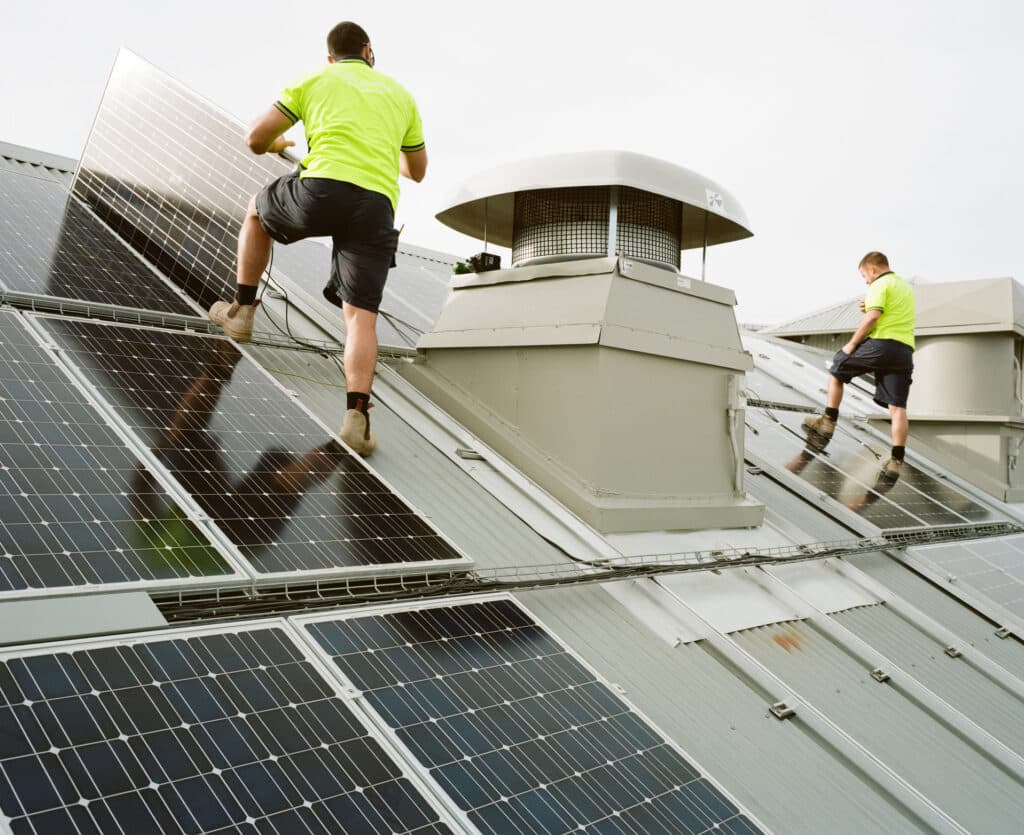How U.S. Immigrants Can Shape the Solar Energy Industry

 Why you can trust us
Why you can trust us
Founded in 2005 as an Ohio-based environmental newspaper, EcoWatch is a digital platform dedicated to publishing quality, science-based content on environmental issues, causes, and solutions.
People have been immigrating to the United States for decades in pursuit of the “American Dream.” Immigrants may only make up 13% of the U.S. population, but they comprise 16% of the workforce.1
While immigrant workers can be found in all sectors, they’re particularly prevalent in fields that are helping to drive clean energy technology and innovation — including the solar industry.
One immigration lawyer believes that immigrants play a vital role in America’s pursuit of clean energy technology.
“We need an immigration system that prioritizes the attraction and retention of scarce, high-end talent needed to invent and commercialize alternative energy technology and other emerging technologies,” Richard Herman said in his report titled Why Immigrants Can Drive the Green Economy.2
Supporting immigrant-owned or -operated solar companies can be a great way to boost America’s speed in solar adoption while also helping your community.
The Solar Industry and Immigrants

Many scientists and engineers in America are immigrants. People who were born in another country make up nearly one-fourth of all STEM (science, technology, engineering and math) workers in the U.S.3
While the national solar industry is booming, America is still behind China and European countries in the race toward clean energy.4
The U.S. needs roughly 650,000 more solar workers to meet the 2035 clean energy and climate change goals set by President Biden.5 But clean energy employers say they struggle to expand due to a lack of skilled, qualified workers.6
This gap presents opportunities for immigrants to utilize their talents and skills in the country’s growing renewable energy sector.
Challenges Immigrants Face for Employment
Immigrants make up 16% of our workforce, but that number could be higher without the struggles and adversities that come with moving to a new country. Many immigrants — especially refugees — struggle to find long-term employment in the U.S.7
It’s a phenomenon that’s been referred to as “brain waste” — when highly skilled workers move to a new country but are unable to bring their full potential to the economy for various reasons.8 Those reasons could be anything from visa or licensing limitations, language barriers, discrimination, financial burdens or a lack of educational opportunities.

Immigration and Visa Limitations
Obtaining proper licensing is one of the biggest obstacles for immigrants in the U.S. Visas and licensing were especially restrictive during the Trump administration but have improved slightly since President Joe Biden took office in 2021.
The problem is that it’s hard to get permission to work in the U.S. before getting a job offer. Most work permit and visa applications can take months or even a year to be approved.
Being an undocumented immigrant creates even bigger barriers to finding work. However, according to Informed Immigrant, working in the technology sector is open to everyone, regardless of immigration status.9 Many people choose to work as independent contractors to avoid the hoops.
Language Barriers
Mohammed Aldhaheri, a computer programmer with 15 years of experience and a college degree, told the BBC that it took him more than two years to find an IT job when he moved to America. It wasn’t until he completed six months of night courses to enhance his English, among other skills, that he was finally offered a technical support position at a hospital.10
In addition to those with less proficiency in English, certain groups of immigrants — notably asylum seekers and Black and Hispanic migrants — are more likely to be underemployed.11
Educational Opportunities
Whether you’re trying to become a solar engineer or a solar panel installation technician, you will need proper training and education to get started. And as we all know, education costs money and takes time to complete.
Data shows that 32% of U.S. immigrants over the age of 25 have a bachelor’s degree or higher, which is comparable to the 33% of U.S.-born adults with the same levels of education.12

However, educational attainment can vary depending on a person’s country of origin.
The most recent data (from 2018) shows that 70% of immigrants from India have a bachelor’s degree or higher, followed by 74% from the United Arab Emirates, 73% from Taiwan, 70% from Singapore and 69% from Saudi Arabia. Only 7.7% of immigrants from El Salvador have a bachelor’s degree, followed by 7.2% from Mexico, 6.9% from the Marshall Islands and 5.4% from Micronesia.13
Additionally, some immigrants who completed degrees or certifications abroad may find their achievements don’t meet American requirements and qualifications, which can force them to revisit school.
Financial Burdens
In 2016, the median income of foreign-born households in the U.S. was $53,200, compared to a U.S.-born resident’s median household income of $58,000.

But similar to education opportunities, household earnings vary based on country of origin.
A Pew Research Center study found that foreign-born households from South and East Asia earned $78,000 in the U.S. in 2016, followed by Europe and Canada at $65,000, South America at $56,000, the Middle East at $53,000 and Sub-Saharan Africa at $52,000. Mexican-born households earned $41,500, Central American households earned $43,000 and Caribbean households earned $44,000.14
Solar Energy Job Resources for Immigrants
While there are plenty of ways to break into the solar market, it can be daunting to get started. Below is a list of programs that can help immigrants find employment opportunities in the renewable energy field.
- Solar Training Network: The U.S. Department of Energy has a Solar Training Network that connects people interested in solar careers with the training they need to enter the industry. Check out its website to find locations near you.
- Solar Energy International: This organization offers need-based scholarships to cover tuition costs for solar training programs. Its website features programs, like Project Solar Rise Maryland, that offer immigrants solar skills job training and support for job placements.
- National Renewable Energy Laboratory (NREL): NREL is home to leading scientific talent from more than 70 different countries. The organization understands the importance of inviting immigrants to the renewable energy conversation. As such, it offers visas and helpful resources for those interested in solar research.
- Midwest Renewable Energy Association: This association offers professional solar photovoltaic (PV) training and skill-building courses both in person and online. Courses range from $55 to $1,899.
Immigrant and Minority-Owned Energy and Solar Companies
To support and promote diversity in the solar industry, it’s helpful to know which solar panel companies are owned by immigrant and minority communities. Below are a few companies that we found through a database created by the Solar Energy Industries Association (SEIA).
Abender Corporation
What: Small electrical contracting business that specializes in designing and installing commercial and specialty solar PV systems
Where: Pittsburgh, Pennsylvania
Minority Ownership: Latino/Hispanic
Website: abender.com
Boviet Solar
What: Solar panel manufacturing company
Where: San Jose, California (with global headquarters in Vietnam)
Minority Ownership: Vietnamese
Website: bovietsolar.com
High Road Clean Energy LLC
What: Early-stage development of utility-scale solar and energy storage projects
Where: Austin, Texas
Minority Ownership: Black/African American
Website: highroadcleanenergy.com
Invaleon Solar Technologies
What: Solar panel company in Massachusetts
Where: Haverhill, Massachusetts
Minority Ownership: Asian
Website: invaleonsolar.com
iSolar, LLC
What: Project developer for solar PV systems that handles design and product selection
Where: Charlotte, North Carolina
Minority Ownership: Asian
Website: isolar.energy
Kala Energy, LLC
What: Services for solar equipment supply, consulting, financing, sourcing and project development
Where: Glendale, California
Minority Ownership: Asian
Website: kalaenergy.com
Red Dipper, Inc.
What: Electrical and solar installation and supplies
Where: San Francisco, California
Minority Ownership: Black/African American
Website: reddipper.com
Why Should You Support Immigrant-Owned Businesses?
Research shows that immigrants help the American economy grow, especially at the local level.15 Below we’ll look at some of the top reasons you should support immigrant-owned businesses.

Immigrant Financial Independence
Starting a new business is one of the biggest pathways to achieving financial independence. This is especially important for immigrants, who tend to face far more barriers to employment compared to non-immigrants in the U.S.
Supporting immigrant-owned companies is one of the best ways to support immigrant communities in your area.
Job Creation
Did you know that immigrants are more likely to start a new business in America? It’s true. Between 1996 and 2011, immigrant-owned businesses increased by 50%, while non-immigrant-owned businesses declined by 10%.16
By creating more businesses, immigrants are providing millions of jobs for U.S. workers, therefore generating billions of dollars in annual income for our country.17
Close Wage Gap and Equity
On average, immigrants earn 12% less per hour compared to American-born workers.18 And despite what some may debate, research shows that immigrants are unlikely to drive down the wages of Americans. In fact, it’s quite the opposite. One study showed that between 1990 and 2004, immigration caused a 4% wage increase for the average native-born worker in California.19
When you support an immigrant-owned solar business, you’re helping to close the wage gap and improve pay equity in America — all while lowering your energy bills and helping the planet.
Subscribe to get exclusive updates in our daily newsletter!
By signing up, you agree to the Terms of Use and Privacy Policy & to receive electronic communications from EcoWatch Media Group, which may include marketing promotions, advertisements and sponsored content.

 233k
233k  41k
41k  Subscribe
Subscribe 



